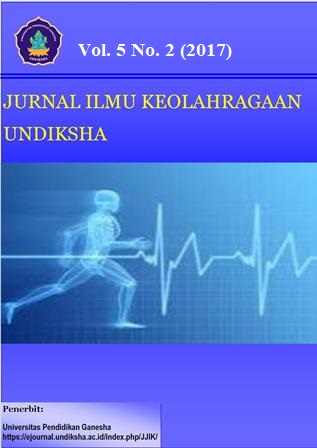PENGARUH PELATIHAN FARTLEK TERHADAP PENINGKATAN VOLUME OKSIGEN MAKSIMAL DAN KECEPATAN PADA SISWA EKSTRAKURIKULER SMPN 3 SINGARAJA TAHUN 2018
DOI:
https://doi.org/10.23887/jiku.v5i2.14908Abstract
Penelitian ini bertujuan untuk mengetahui: (1) Pengaruh pelatihan fartlek terhadap peningkatan VO2 Maks pada siswa ekstrakurikuler futsal SMPN 3 Singaraja, (2) Pengaruh pelatihan fartlek terhadap peningkatan kecepatan pada siswa ekstrakurikuler futsal SMPN 3 Singaraja. Jenis penelitian ini yaitu Penelitian eksperimen. Pengumpulan data dilakukan menggunakan tes dan pengukuran. Instrumen yang digunakan yaitu test MFT dan Sprint 50 meter. Análisis data yang digunakan statistik inferensial (uji-t). Hasil penelitian untuk variabel VO2 Maks yaitu Gaint score kelompok kontrol mean 1,79. Kemudian untuk variabel VO2 Maks kelompok perlakuan yaitu Gaint score mean 5,75. Sedangkan pada variabel kecepatan kelompok kontrol yaitu Gaint score kelompok kontrol mean 0,098. Kemudian untuk variabel kecepatan kelompok perlakuan yaitu Gaint score kelompok perlakuan mean 1,07. nilai mean tertinggi yaitu terdapat pada kelompok perlakuan pada variabel VO2 Maks dan kecepatan, sedangkan nilai terendah yaitu kelompok kontrol, dengan hasil gaint score kelompok kontrol dan perlakuan pada VO2 Maks didapat nilai signifikansi 0,000 pada taraf sig (α) 0,05, dengan demikian hipotesis diterima, karena nilai signifikansinya lebih kecil dari nilai α (sig < 0,05). Sedangkan untuk variabel kecepatan didapat nilai signifikansi 0,000 pada taraf sig (α) 0,05, dengan demikian hipotesis diterima, karena nilai signifikansinya lebih kecil dari nilai α (sig < 0,05). Berdasarkan hasil analisis data, dan pembahasan disimpulkan sebagai berikut: (1) Metode pelatihan fartlek berpengaruh terhadap peningkatan volume oksigen maksimal. (2) Metode pelatihan fartlek berpengaruh terhadap peningkatan kecepatan.Kata Kunci : pelatihan fartlek, volume oksigen maksimal, kecepatan.
The purposes of this research are to know: (1) Influence of fartlek training to increase VO2 Max in futsal extracurricular students of SMPN 3 Singaraja, (2) Influence of fartlek training on speed upgrading of students of extracurricular futsal SMPN 3 Singaraja. The type of this research is experimental research. The data were collected using tests and measurements. The instrument which was used is MFT and Sprint test about 50 meters. Analysis of data used inferential statistics (t-test). The result of the research for Max VO2 variable is Gaint score of control group mean 1.79. Then for the variable VO2 Max group treatment is Gaint score mean 5.75. Whereas in control group velocity variable that is Gaint score of control group mean 0,098. Then for treatment group velocity variable that is Gaint score of treatment group mean 1.07. the highest value is found in the treatment group on the variable VO2 Max and velocity, whereas the lowest value is the control group, with the result of gaint score of the control group and the treatment on VO2 Max obtained the significance value 0.000 at the sig (α) 0.05 level, thus the hypothesis accepted, because the significance value is less than α (sig keyword : fartlek training, maximal oxygen volume, speed.
Published
2018-07-24
How to Cite
Harianto, R. A., Yoda, I. K., & Tisna, G. D. (2018). PENGARUH PELATIHAN FARTLEK TERHADAP PENINGKATAN VOLUME OKSIGEN MAKSIMAL DAN KECEPATAN PADA SISWA EKSTRAKURIKULER SMPN 3 SINGARAJA TAHUN 2018. Jurnal Ilmu Keolahragaan Undiksha, 5(2), 11–20. https://doi.org/10.23887/jiku.v5i2.14908
Issue
Section
Articles
License
Authors who publish with the Jurnal Ilmu Keolahragaan Undiksha agree to the following terms:- Authors retain copyright and grant the journal the right of first publication with the work simultaneously licensed under a Creative Commons Attribution License (CC BY-SA 4.0) that allows others to share the work with an acknowledgment of the work's authorship and initial publication in this journal
- Authors are able to enter into separate, additional contractual arrangements for the non-exclusive distribution of the journal's published version of the work (e.g., post it to an institutional repository or publish it in a book), with an acknowledgment of its initial publication in this journal.
- Authors are permitted and encouraged to post their work online (e.g., in institutional repositories or on their website) prior to and during the submission process, as it can lead to productive exchanges, as well as earlier and greater citation of published work. (See The Effect of Open Access)










